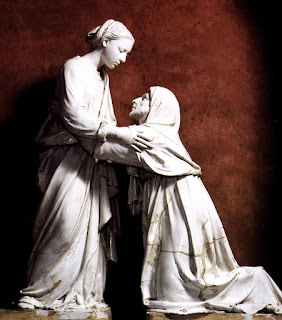Elizabeth, Did You Know?
This morning I was freshly struck with wonder at Matthew's account of the life of Jesus, in the fourteenth chapter. Contained within the artificial boundaries of this chapter we find a dramatic sweep from one of the deepest valleys of Jesus' life to one of the most dramatic heights. I want to focus in here upon the opening of chapter 14 because it relates to this season of Advent: the death of John the Baptist.
How does John's death relate to Advent? John the Baptist is a central figure in Advent time. He is the forerunner of Christ - the one who leaps in the womb of his mother at the coming of his in utero Messiah and later prepares the way in the wilderness for him.
I've read the story of his beheading a thousand times, but today, during the season of Advent, John's death surprised me in a new way. It wasn't John I was thinking about. It wasn't even Jesus as much (though, his grief at John's death and immediate withdrawal into solitude are very instructive for us about Jesus' humanity and emotional life). It was Elizabeth.
Elizabeth, who along with her stunned-mute-husband, Zechariah, were selected to conceive and give birth in their old age to the Messiah's forerunner. Elizabeth, who at the visitation of Mary, was transported into worship along with the leaping babe within her womb.
Elizabeth, did you know that your baby boy would one day die an early death, his head served up on a platter at the whim of a wicked King's daughter?
John's life can sometimes seem so insignificant, if I'm honest. He wasn't named as one of Jesus' disciples. He wasn't there at the cross, or the resurrection, or the ascension. His mom and dad were well past their prime. He wore the hide of a camel and ate locusts in the desert. The people he "prepared" for the Messiah seemed to later wholesale reject the Messiah - "Crucify him!" just a few years after getting washed in the Jordan.
Injustice, violence and death on the heels of promise, prophecy, preparation. Elizabeth, did you know your boy would one day have his head served up on a platter?
John, Jesus, Elizabeth, Mary - the cast of characters most near to the heart of Advent - all acquainted with grief, sorrow, death. Each lived a life incongruent and shockingly against the grain of the dominant culture.
Is there hope in this story? Is there peace? Is there joy? Advent begins in the dark, writes Fleming Rutledge. In the dark of waiting, hurting, longing, wondering, watching, the light of Christ dawns upon us. The prophet Isaiah said that the light will shine - the light of seven days of full sun (Isaiah 30).
The light has dawned. Christ has taken up poverty and death, so that the world can be turned upside down. Christ is our life; we are hidden in him - the one who allowed the full weight of earth's violence fall upon him. We wait and watch and work and pray and love in the meantime, in the promise that Christ has come and he is near and he will come again.
This is not pie-in-the-sky religion. This is not escapism. This is not naivete. How do we know? Jesus wept at the death of John. He was stricken with grief over the wickedness of man, over the unjust abrupt ending to John's life. But he knew that the blow of the sword would not have the final word.
Come Lord Jesus, come.
Addendum. I came across this relevant quote the following day in Fleming Rutledge's Advent, pp. 277-8:
“John the Baptist is the new Elijah, standing at the edge of the universe, at the dawn of a new world, the turn of the ages. That is his location as the sentinel, the premier personage of this incomparable Advent season - the season of the coming of the once and future Messiah. John’s divinely ordained location in the world…is on the frontier of the ages as God arrives in his world to turn it away from its past of sin and bondage toward a future of promise and freedom. John’s function is to proclaim the coming reversal of the downward spiral of human history, to deliver the message of the invading Son of God. He cries, “Already the axe is laid at the root of the tree…” The whole purpose of John the Baptist is to announce the beginning of the end….the import of John the Baptist as Mark’s opener could not be more clear: when Elijah comes back, the next person to appear will be God, and it will be the first day of the age to come…John the Baptist, whose single-minded life and horrendous death at the hands of the powers and principalities are a preview of Jesus’ own death. What a strange story we Christians have to tell! It is in the suffering and death of God’s servants at the hands of despots and tyrants that God’s new rule is made manifest.


Comments